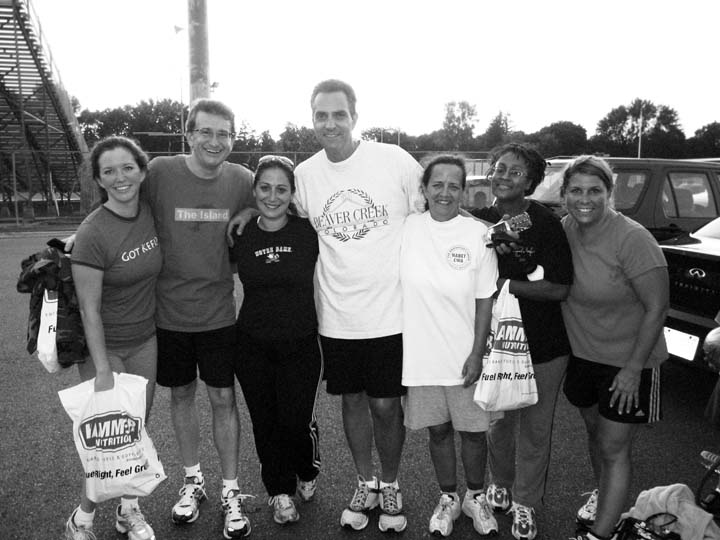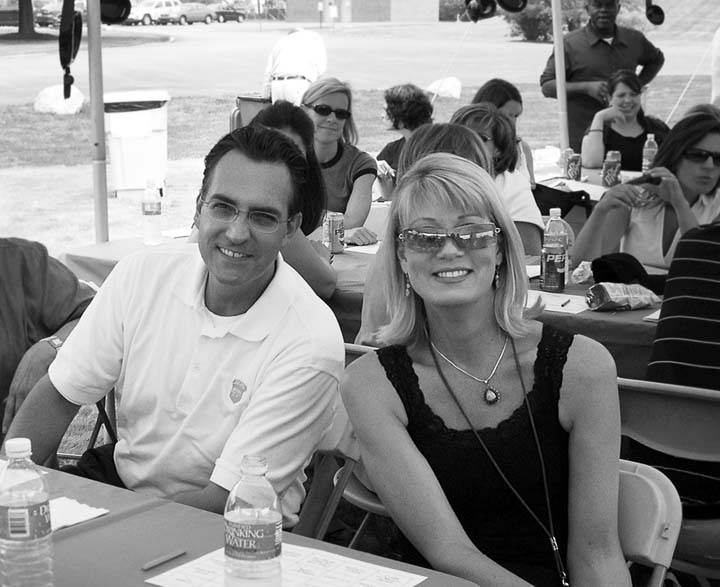
Jeff Murri, the charismatic vice president and general manager of Detroit’s Fox 2 (WJBK-TV), was walking across the parking lot of his favorite lunchtime restaurant after a business meal with his general sales manager, Sheila Bruce, when a motorist stopped at a nearby red light had his speakers pumping music so loudly that Murri barely could hear his voice in conversation.
How did the nattily suited, conservative-looking media executive react? “[The driver] was kind of bopping to the music, and Jeff started bopping along, too,” recalls Bruce, hired by Murri 18 years ago and generally considered his closest friend at WJBK.
“Then he went into a full dance! The guy was shocked. Here was this man in a business suit, in the middle of a parking lot, doing a dance along with him.
“Cars were backed up 20 deep. And the gentleman had a smile bigger than life on his face. You know he drove away thinking, ‘Wow!’ ”
Murri was a man who danced joyously to the music of his life. And what a life it was. “He was one of those people who was not afraid to be himself,” Bruce says. “And being Jeff Murri made other people’s day better.”
Unlike most of us, Murri was blessed to have two distinct families that adored him. As Fox 2’s GM since 2001, he spearheaded the station’s transition into a Detroit version of CNN, airing a staggering 11 and a half hours of live local news every weekday and another 11 and a half on weekends, generating mounds of local advertising revenue and making him the darling of Fox’s New York boardrooms. For a station beset by a history of iron-hearted, irascible leaders (“Wild Bill” Flynn gallops to mind), WJBK achieved this tectonic shift in broadcast philosophy with barely a rustle of internal grousing.
That’s because station oldtimers watched Murri grow up at Channel 2, the kid from Shelby Township hired as a local account executive in 1984. He was your son, your brother.
“When I got to the station, they called him ‘The Babe,’ because he was so young,” says Marla Drutz, vice president and general manager of rival WDIV-TV (Channel 4) who worked briefly at WJBK. He rose steadily through the sales ranks, departed to Atlanta and New York for a few years of seasoning, then returned home to eventually assume the reins of the place where his business life began.
Murri knew every person at Fox 2, the maintenance man to the 4:30 a.m. Fox 2 News Morning crew, since he often arrived by 5. He knew their kids’ names, their hobbies. More important, they knew him. They respected and trusted him. If there can be such a thing as a love affair between a boss and his employees, it blossomed on Nine Mile Road in Southfield. Murri spent more time strolling through the newsroom, poking his head into cubicles, or kibitzing with co-workers than buried in his office, his resounding voice bouncing off walls. “You could hear him coming down the hallway,” says Dana Hahn, the WJBK vice president of news tasked with building the station’s mountain of daily coverage. “He was either whistling, singing, or laughing. He was just such a fun person to be around.
“The majority of our newsroom has been here since at least 1996, so it’s a family. And Jeff was the head of that family.”
His other family was indelibly intertwined with that one. He met his wife, Heather, at WJBK in 1990 while she was working as research director. “We started as friends, and to my credit, I grew to adore and love him,” she says. His older brother, Mike, is station manager at another prime rival, Detroit’s Channel 7 (WXYZ). “It was always nice to have a common interest, being in the same industry, but we really were fierce competitors, my brother and I,” Mike says. “[He’s] your best friend, like Eli and Payton [Manning]. You laugh together, but you know every day you go in to win.”
Laughter was the predominant noise whenever the brothers got together. “It was like growing up with Alex P. Keaton and Jim Carrey,” says their sister, Jennifer Kenny, suggesting that anyone who knew them would understand which was which. “The Murri boys,” observes one Detroit television veteran, “were always operating on the kind of energy level you use to launch space shuttles.”
They were part of a big, joyous Italian clan. Their father, Louis, a retired Cadillac executive, and mother, Patricia, are healthy and active at 81 and 73 respectively. Every Sunday after Mass at St. Irenaeus, the family would gather at their home for a festive, raucous lunch: Jeff, Heather, and their sons, Luigi, 17, and Dominic, 12; Mike, wife Mary, and their family; Jennifer, her husband, Tom, and their kids. Family friends often joined in, too. “The birthdays, anniversaries, holidays, a special achievement, we seem to be always celebrating something,” Patricia says. “It’s very nice to get together, laugh, and enjoy a good meal.”
Jeff’s unique blend of enthusiasm, personality, and unbridled devotion to his home region could charm even the most cynical observers of local TV. “It is not very often that I get the opportunity to enjoy a meaningful and warm relationship with members of the media,” wrote the Rev. Wendell Anthony, president of the Detroit branch of the NAACP, in the greatest understatement you’ll read today. “However, Jeff Murri demonstrated himself to be a very sensitive, caring, and open professional. He was concerned about our city, this region, and all people, regardless of race or background.”
His commitment didn’t go unnoticed on the national stage, either. Last December, at the relatively young age of 50, Murri was hailed as America’s 2011 General Manager of the Year by Broadcasting & Cable magazine, a source of authority for the television industry. “Jeff had been on the short list the year before, actually,” reveals Michael Malone, the B&C deputy editor who wrote the award story. “But I thought he was a great guy, a great general manager, so I ended up doing a profile on him, ‘Fox Go-To Guy Made in Michigan.’
“He just blew me away,” Malone says. “He had this motor that seemed to go 24-seven. Being a GM can be a very nomadic life, where you’re moving on to bigger markets your whole career. This is a guy who was born in the market, grew up in the market, and was quite naturally a cheerleader and champion for Detroit. It wasn’t just, ‘Hey, here’s the city I pulled into a year ago.’ I think he felt it was his mission to do good, not only for his station but for his friends, neighbors, and loved ones in the community.”

To the community he loved, to the friends and neighbors who loved him, the question still lingers like the aftermath of a migraine, leaving the kind of pain and confusion that disrupts the senses. Murri, this inspiring leader revered by his workers … this 50-year-old family man with the lovely wife and the great kids and the devoted parents … this Detroit broadcasting crusader at the pinnacle of his profession. How could this man maneuver his car through the tightly trimmed streets of Rochester Hills one icy Thursday morning, make the turn onto Old Perch Road, drive up the slight incline to the parking lot behind the Murri’s family parish, park beneath the shadow of the majestic cross atop the church and in view of the statue of St. Irenaeus, the martyr who helped lay the foundations for Christian theology — and take his own life?
Bruce looked for Murri’s long black Cadillac sedan in its familiar pole position at the rear of Fox 2 when she arrived for work last Feb. 2, because he was customarily the first management member to arrive. This morning, the stall was empty. “I wondered where he was,” she recalls, “but he sometimes would have a meeting in the morning before he came in, so it didn’t strike me as totally unusual.”
He had called the office and left a message before 8 a.m. for his longtime executive assistant, Kathy McAlpine, that he would be late that morning. Murri may schedule appointments outside the office, but he never began his workday late.
As Thursday charged into full gear, vice president of news Hahn called Murri’s office (the two talked in person, on the phone or emailed almost constantly throughout the day). The boss was conspicuous by his absence. By 9:30 a.m., McAlpine poked her head into Bruce’s office asking if she had heard from him. Jack Abernethy, CEO of the Fox Television Stations, was calling. When New York calls, you respond. Bruce immediately sent Murri a text. No reply. She called his cell phone. No answer. “Then I immediately called his wife, just to ask if there was anything we should be aware of at the station,” Bruce says.
Mild concern was deepening into worry. After several more calls, Hahn dispatched a staffer to drive the route Murri would have taken from his home in Utica to the station. This was possible because Murri was an almost obsessive creature of habit. “We used to tease him because we would have our Christmas party at the same venue every year, year after year, and with the same food,” Hahn says. “I would try to push him out of the box and say, ‘Jeff, instead of chicken, can we please have fish this year?’ ”
After the WJBK truck departed on its mission, Hahn took another, extraordinary step: She dispatched the Fox 2 traffic helicopter to search for Murri’s car from above. “I was concerned that maybe there was an automobile accident,” she says. “We had that happen maybe 25 years ago; one of our reporters didn’t show up for work and his car had gone into a ditch. It took three days before anybody found him. I think that was on the minds of people at our station. At least, for me it was.”
Murri had talked of giving his Caddy to Luigi, a suggestion that elicited howls of laughter from station cohorts. (“He’s 17 and you’re going to give him this land barge? It’s your son’s first car!”) A lover of the outdoors and occasional hunter, he kept guns in the trunk. Better in his car than in the house with two young sons. He regularly brought them onto station property, but never inside the building. He was the GM. Who was going to tell him he couldn’t?
Meanwhile, word of his disappearance raced through the Murri family. As soon as Mike received the news at Channel 7, he had a hunch: His brother was a deeply spiritual man who practiced his faith in tangible ways. He proposed to Heather in a chapel. If anything was troubling him, he might go to church to pray about it.
Mike jumped in his car and raced to Rochester Hills, relaying directions to Hahn on his cell phone for the chopper pilot to follow. He arrived at St. Irenaeus moments before the helicopter, spotted his brother’s car, and looked inside.
“Call 911!” he shouted. The phone went dead.
The Rev. Brian Chabala, pastor at St. Irenaeus, returned to his church that afternoon after saying Mass for schoolchildren at a neighboring parish to find his parking lot cordoned off by yellow police tape, multiple helicopters circling overhead, Oakland County Sheriff’s deputies surveying a car they had covered with a massive tarp — and the Murri family waiting for him in his office. “That’s how I walked into it,” he remembers. “The Murris have such a place here. They’re still struggling. I can see it in their eyes. But I think they may be even tighter now after his passing.”
The struggle is widespread. Think of the best boss you ever had. Imagine that person dying suddenly, unexpectedly, totally without warning. Would you be sad? Probably. But would you be emotionally shattered by the loss? Would you, like Huel Perkins, the urbane, ever-composed Fox 2 lead anchor, break into tears on the air while announcing the death? (“Jeff and I would frequently have raging discussions about politics, news, and culture,” Perkins would say later. “Still, every debate, no matter how passionate, ended with a handshake and a smile. He was my boss, but more importantly, he was my friend, and one of the most extraordinary people I’ve ever known.”)
So the station known for its “Problem Solvers,” the investigative unit that has logged more than 12,000 viewer concerns last year alone, is hit with a problem it can’t solve, a mystery it cannot explain. “There is a certain irony in all this to me,” says Jeff Edwards, board chair of the Metro Detroit/Ann Arbor chapter of the American Foundation for Suicide Prevention (AFSP), who distinctly recalls being keynote speaker at a community forum on preventing suicide held several years ago in the studios of Fox 2 — orchestrated and emceed by Murri.
According to AFSP statistics, men are nearly four times more likely to commit suicide than women. And, while readily acknowledging that he knows nothing of Murri’s specific circumstances, Edwards adds, “The reason, in over 90 percent of cases, that people take their lives is because they were suffering an undiagnosed mental illness. Why is it always the people you least expect who do these things? It’s not the quantifiable lunatic who’s doing something crazy in front of us who is apt to do it. It’s the one who on the surface looks like the happy, successful family man. Those are the ones that catch us off guard, because it’s illogical. It doesn’t even make any sense for them, being the intelligent, successful people that they are.
“In the mystery surrounding why Murri did this, there’s one school of thought that says, ‘We don’t want to tarnish his image by suggesting something that’s unverifiable.’ And it’s like, ‘What did he have to be depressed about?’ But it’s not that kind of thing. It’s an illness.”
According to the Oakland County Medical Examiner’s Office, the suicide rate in Oakland County has exploded 21 percent since 2008. That statistic is tragic, yet nearly understandable given the volume of job losses, foreclosures, and other lamentable circumstances in the region. But for Murri, no explanation seems sensible.
Fox had ordered WJBK to undergo multiple layoffs and dismissals in recent years, forcing the perennially upbeat Murri to disown members of his beloved work family. After one particularly difficult termination, a program director who had been with the station more than 20 years, Murri had to leave the building for several hours to compose himself. Heather confirms he’d been having trouble sleeping for some time; others believe he really hadn’t slept in weeks. Mike, who effectively lost three people — his brother, best friend, and chief business competitor — thinks the side effects of prescription medications his brother was taking could have triggered dark thoughts. “The chemical imbalance of the drugs on that day,” he says. “Everything points to that.”
The “why,” however, is immaterial, now. The “what next” is all that matters.
Perkins clearly was not alone in his emotions. As timing would have it, Murri’s wake was set for the following Sunday, Feb. 5 — Super Bowl Sunday. “I got there about 6 in the evening, thinking it might not be as crowded,” Drutz remembers. “I waited almost an hour just to walk past the casket and give the family my condolences.” At one point, the line of mourners wrapped entirely around the Potere-Modetz Funeral Home in Rochester, the largest visitation in the mortuary’s 26-year history.
The funeral at St. Irenaeus was equally overwhelming. Well over 1,000 people packed the 800-seat church, prompting the opening of two additional annexes normally reserved for Christmas services. “In our tradition, there’s so much we don’t understand when a person is pushed to an extreme,” Chabala said in his homily. “Maybe in the end we didn’t realize that he needed care as much, because he just sort of spent himself being concerned about other people.”
Mike had no intention of speaking at the service. He knew he wouldn’t be able to handle it emotionally. But as he soaked in the size of the crowd and the pure outpouring of affection, he was overcome by the moment. He caught Father Brian’s eye and ascended the pulpit. “I told everybody, ‘Thank you for being here, thank you for supporting our family, thank you for being there for us in the future,’ ” Mike says. “And don’t be afraid to talk about my brother. Share a story, share a laugh. Because when you have a strong faith, you can get through more than you ever thought you could.”
He received a standing ovation.
Faith has been tested to the extreme at WJBK. Eight days after Murri’s death, Jeff Zaslow, the bestselling author and husband of longtime Fox 2 anchor Sherry Margolis, was killed in a Northern Michigan auto accident. The tragedy overshadowed Murri on a local and national level, but only compounded the heartbreak inside the station. The next month, on the same March day reporter Bill Gallagher officially retired after 27 years at WJBK, Rodney “Hot Rod” Ferguson, an extremely popular Channel 2 photojournalist, died without warning of complications from sickle cell anemia — like Murri, at the vibrant age of 50. Grief counselors were practically working in shifts.
Yet it’s Murri’s passing that has left the deepest void and most profound legacy for Detroit’s Fox affiliate. To mark Earth Day, in April, the station dedicated an urban garden in his memory.
At last report, his office remains almost exactly the way it looked last February, yet WJBK doesn’t want it to turn into some sort of eerie shrine. So far, there has been no need to use it. For now, Bruce and Hahn are co-managing the station, putting aside the natural animosity between news and sales executives at any media outlet to keep Fox 2 on an even keel. Murri would have expected no less.
“When I first came to work here, I was honestly not very proud to say I worked at WJBK,” Hahn admits. “It was not a very good station; it had no focus and it was very mismanaged. I think the biggest thing Jeff did for this television station over the years was that he brought together a great team, he gave us a vision, and he gave us roots into the community. That’s why people love Fox 2, because we’re a part of this crazy Detroit area, and he believed in that. He believed in giving back. I think that’s his legacy.”
WARNING SIGNS:
> Talking about wanting to die
> Looking for a way to kill oneself
> Talking about feeling hopeless or having no purpose
> Talking about feeling trapped or in unbearable pain
> Talking about being a burden to others
> Increasing the use of alcohol or drugs
> Acting anxious, agitated, or reckless
> Sleeping too little or too much
> Withdrawing or feeling isolated
> Showing rage or talking about seeking revenge
> Displaying extreme mood swings
The more of these signs a person shows, the greater the risk. Warning signs are associated with suicide, but may not be what causes a suicide.
WHAT TO DO:
If someone you know exhibits warning signs of suicide:
> Do not leave the person alone.
> Remove any firearms, alcohol, drugs, or sharp objects that could be used in a suicide attempt.
> Call the U.S. National Suicide Prevention Lifeline at 800-273-TALK (8255).
> Take the person to an emergency room or seek help from a medical or mental-health professional.
Source: American Foundation for Suicide Prevention
|
|
|









